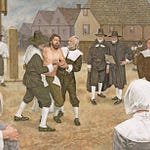
The Moral Collapse of Judah
When the prophet Habakkuk surveys the nation of Judah, God’s covenant people, he sees violence wherever he looks. Corruption fills the courts. God’s holy law has become powerless, twisted by those who were meant to uphold it. The poor are crushed by the rich, the righteous are mocked by the wicked, and the prophets who speak against sin, such as Jeremiah, are ridiculed.
They kept mocking the messengers of God, despising his words and scoffing at his prophets, until the wrath of the Lord rose against his people, until there was no remedy. (2 Chronicles 36:16)
Habakkuk lives in a time when the temple still stands in Jerusalem, yet the people’s fear of the Lord is gone. They’ve traded truth for sin. Justice is for sale, the weak are oppressed, and idolatry is rampant. Since the death of King Josiah, a man who brought godly reforms, Judah has quickly descended into moral darkness.
This is not a pagan nation that has never known the true God. This is Judah, the descendants of Abraham, Isaac, and Jacob. King David, “a man after [God’s] own heart,” ruled only a few centuries earlier (1 Samuel 13:14). Josiah was their king mere years before. Meanwhile, Jeremiah has been warning them faithfully to repent, but they refuse to listen.
It is within this tragic setting that Habakkuk cries out:
O Lord, how long shall I cry for help,
and you will not hear?
Or cry to you “Violence!”
and you will not save?
Why do you make me see iniquity,
and why do you idly look at wrong?
Destruction and violence are before me;
strife and contention arise.
So the law is paralyzed,
and justice never goes forth.
For the wicked surround the righteous;
so justice goes forth perverted. (Habakkuk 1:2–4)
Setting aside the prophet’s accusatory tone, his assessment of Judah’s sins is accurate. The Lord’s response is essentially, “Yes, they are guilty. I agree with you, so I will bring judgment against them.”
While Habakkuk will need to learn his own lessons—namely, trusting God’s providence when he doesn’t understand what God is doing—his view of Judah’s spiritual condition is correct. His frustration comes from the right place. What he sees among his brethren is awful—injustice, idolatry, rebellion, arrogance, oppression, violence.
Again, he’s not observing this in a distant pagan land. He’s among God’s people. He’s in Judah, likely in Jerusalem, where he sees the law paralyzed and injustice in the courts. He will later compose a psalm to be sung in the temple. He’s at the very heart of God’s covenant community, but what he witnesses is anything but faithfulness. Despite any outward attempts at worship, Judah behaves no differently from the godless nations around them.
Habakkuk’s Cry for Help
Can you relate to the prophet’s distress?
These days, I rarely read news stories in full. The headlines alone often say enough. In just the past week, I’ve seen reports of corruption in the U.S. Justice Department, corruption in Australia’s federal government, and the military in Sudan killing civilians. Nigeria remains one of the most dangerous places in the world for Christians, as state-backed persecution continues. A police raid against protesters in Brazil left more than a hundred people dead.
At a recent pro-life dinner, the keynote speaker explained that the abortion rate has actually increased since Roe v. Wade was overturned. Some states, like Indiana, have banned abortion, but many travel to neighboring states to obtain them. So the rates in places like Illinois and Michigan have risen sharply.
I remember the confusion and frustration I felt back in 2020 as I watched American cities burn, while politicians and the media justified and even applauded the destruction. I remember reading about a satanic statue erected in a government building, and when a state congressman, fueled by righteous indignation, knocked it over, he was charged with a hate crime.
Woe to those who call evil good
and good evil,
who put darkness for light
and light for darkness,
who put bitter for sweet
and sweet for bitter! (Isaiah 5:20)
We see enough wickedness in this world to cry out, “O Lord, how long?” (Habakkuk 1:2).
That’s where Habakkuk is when we meet him. He’s a man agonizing over the evil around him, pleading with God to act. Meanwhile, beyond Judah’s borders, a storm is gathering in the east.
A World in Turmoil
For decades, the Assyrian Empire ruled the Near East with an iron fist. Its armies crushed nations, enslaved peoples, and filled the earth with terror. Even Judah trembled under their shadow in the days of King Hezekiah. But to everyone’s surprise, that empire collapsed almost overnight. Just a few years before Habakkuk’s prophecy, the capital city of Nineveh fell. Two seemingly insignificant rebel groups—the Medes and the Chaldeans (or Babylonians)—burned it to the ground. It was unthinkable. No one would have predicted the fall of mighty Assyria.
It was, of course, the Assyrians who had conquered the northern kingdom of Israel. Now, the entire geopolitical map was shifting. Around 612 BC, the Medes and Babylonians destroyed Nineveh, effectively ending the Assyrian Empire. King Josiah, Judah’s last righteous king, died only a few years later. Habakkuk’s ministry likely occurred sometime between Josiah’s death and Babylon’s decisive defeat of Egypt around 605 BC.
So, between the fall of Assyria and the fall of Egypt, two major things were happening. Within Judah, the people were sinking into moral decline. Beyond Judah, Babylon was quickly rising to replace both Assyria and Egypt as the world’s dominant power. These events may seem unrelated, but they are deeply connected.
Habakkuk opens with the prophet crying, “O Lord, how long shall I cry for help?” (Habakkuk 1:2). He’s focused entirely on Judah’s spiritual collapse, unaware that Babylon will soon become part of God’s answer.
When the Lord finally replies, it’s in a way both unexpected and unsettling. This is not the response Habakkuk hoped for.
God’s Astonishing Response
The Lord answers Habakkuk’s desperate cry with words meant to shake him awake:
Look among the nations, and see;
wonder and be astounded.
For I am doing a work in your days
that you would not believe if told. (Habakkuk 1:5)
God piles up four commands—look, see, wonder, be astounded. It’s as though he says, Habakkuk, pay attention. There may even be a note of righteous indignation in his tone, since the prophet had accused him of ignoring Judah’s sins. Yet the Lord intends to reveal something far greater than Habakkuk expects.
In the original Hebrew, these commands are plural. God isn’t speaking only to Habakkuk but to the whole nation. His words are not a private reassurance but a public wake-up call.
And they still speak to us. When we look at the world and wonder why God seems inactive, he might well say, “I am doing a work in your days.” It may not be what we want or expect, but he is always at work, directing history, fulfilling his purpose, and carrying out his plan even when we can’t see it.
God’s response directly addresses Habakkuk’s complaint. The prophet accused him of idly watching violence and injustice, but the Lord replies, “No, I am doing something—something you would not believe if told.”
Then, he reveals his plan:
For behold, I am raising up the Chaldeans. (Habakkuk 1:6)
The answer to Habakkuk’s prayer for justice is shocking. God will raise up an unjust, violent nation to punish the injustice and violence within Judah.
The Rise of the Chaldeans
The term Chaldeans is synonymous with Babylonians. At one time, the Chaldeans were a small Semitic tribe near the Persian Gulf, or modern-day Iraq. “Chaldean” described their ethnic identity, while “Babylonian” became their national or political identity as they gained power. For our purposes, the two names refer to the same people.
The Lord’s answer to Habakkuk’s plea for justice is to raise a nation even more violent than Judah. God will use the Babylonians as his instrument of judgment. This isn’t unprecedented. He did the same through Assyria when he judged the northern kingdom of Israel, saying, “For behold, I will raise against you a nation, O house of Israel” (Amos 6:14). God grants power to nations and uses them as his rod of correction.
Habakkuk never expected this. The Lord was right when he said, “I am doing a work … that you would not believe if told” (Habakkuk 1:5). The prophet surely desired mercy or revival, but instead the Lord announces a judgment worse than the disease. God had been strengthening Babylon, a ruthless and godless empire, to bring justice upon a ruthless and godless Judah.
This raises profound questions. How can a holy God use wicked instruments and remain righteous? Habakkuk will soon wrestle with that very issue. But first, the Lord wants Judah to know exactly whom he is raising up.
For behold, I am raising up the Chaldeans,
that bitter and hasty nation,
who march through the breadth of the earth,
to seize dwellings not their own.
They are dreaded and fearsome;
their justice and dignity go forth from themselves. (Habakkuk 1:6–7)
The Babylonians are a people of corrosive anger and reckless speed, like a bear robbed of her cubs. They conquer to conquer. They “march through the breadth of the earth,” sweeping across territories without restraint. Most armies move cautiously, securing one region before advancing to the next, but Babylon surges forward with unstoppable force. History records how quickly they rose, sweeping through Syria and Palestine, then besieging Egypt. No one could stand before them.
The Lord adds that they “seize dwellings not their own,” revealing their imperial ambition. They’re driven by greed for expansion. Here Scripture points backward. In Deuteronomy 6, God told Israel that he would give them “great and good cities that you did not build,” houses full of things they did not fill, and vineyards they did not plant (Deuteronomy 6:10). God had dispossessed the Canaanites and given their land to Israel. Now, in a tragic reversal, he will dispossess Israel through Babylon.
God had warned them of this long ago:
Do not make yourselves unclean by any of these things, for by all these the nations I am driving out before you have become unclean … lest the land vomit you out when you make it unclean, as it vomited out the nation that was before you. (Leviticus 18:24–26, 28)
Now the land will “vomit out” Judah through Babylon’s invasion.
They are dreaded and fearsome;
their justice and dignity go forth from themselves. (Habakkuk 1:7)
“They are a law to themselves,” says the NIV. They recognize no authority but their own. They define justice and honor according to their own desires. Might makes right. As long as they win, they believe themselves justified.
History confirms their arrogance. Babylon’s kings paraded captured religious artifacts from conquered nations to prove their superiority, not only over those nations but over their gods. When Nebuchadnezzar raided Jerusalem, he removed treasures from the temple of the Lord (2 Kings 24:13). Their pride knew no bounds.
Habakkuk now faces an agonizing paradox: If Judah’s sin is injustice, how can God use a nation whose own idea of justice is utterly corrupt?
The Lord continues his description:
Their horses are swifter than leopards,
more fierce than the evening wolves;
their horsemen press proudly on.
Their horsemen come from afar;
they fly like an eagle swift to devour.
They all come for violence,
all their faces forward.
They gather captives like sand. (Habakkuk 1:8–9)
They strike with speed like leopards and devour like hungry wolves. Distance is no obstacle. They “come from afar” and “fly like an eagle.” Even that image recalls God’s earlier warning to Israel:
The Lord will bring a nation against you from far away, from the end of the earth, swooping down like the eagle, a nation whose language you do not understand. (Deuteronomy 28:49)
The prophecy unfolds exactly as God said centuries earlier. He warned that if Israel turned away, a foreign nation would swoop down in judgment. Now, Habakkuk is watching that promise come to life.
The Babylonians “gather captives like sand.” Their armies are relentless, capturing entire populations. Perhaps there’s an echo of God’s promise to Abraham that his descendants would be as numerous as the sand on the seashore. Now, that same “sand” will be carried away into captivity.
At kings they scoff,
and at rulers they laugh.
They laugh at every fortress,
for they pile up earth and take it. (Habakkuk 1:10)
They mock kings and armies. No fortress deters them. They build siege ramps, breach the walls, and conquer. History records this in chilling detail. In 2 Kings 25, Nebuchadnezzar besieged Jerusalem, starved its people, breached its walls, blinded King Zedekiah, and carried the nation into exile.
Then they sweep by like the wind and go on,
guilty men, whose own might is their god! (Habakkuk 1:11)
God makes clear that though he will use the Babylonians, he does not excuse them. They are “guilty men,” idolizing their own power. God’s justice is impartial. Judah’s sin will be judged, and so will Babylon’s. But for now, he raises one wicked nation to humble another.
Even so, Habakkuk is still left with a haunting question: Can God use the wicked to accomplish righteous purposes?
God’s Sovereign Hand in History
Though Habakkuk is overwhelmed by God’s revelation, the Lord’s message reveals at least three essential truths about himself and how he works in the world.
1. God is sovereign over history.
Despite what the Babylonians believed about their own strength, they rose to power only because God raised them up. “For behold, I am raising up the Chaldeans” (Habakkuk 1:6). From the smallest event to the greatest shift in world powers, God rules over it all. Every empire, war, and change in leadership unfolds according to his will.
We may not understand what he’s doing or why, but he never loses control. When Germany starts a world war, when terrorists attack innocent people, when governments rise and fall, when persecution spreads, or when chaos fills our own streets, God is still working out his plan. Evil never escapes his sovereign hand. One day, his people will look back and say, “[The world] meant evil against [us], but God meant it for good” (Genesis 50:20).
2. God is working even when it seems he’s not.
Habakkuk cried, “O Lord, how long shall I cry for help, and you will not hear? … Why do you idly look at wrong?” (Habakkuk 1:2–3). But God replied, “I am doing a work in your days” (Habakkuk 1:5).
The prophet had seen Babylon’s rise but didn’t recognize it as part of God’s plan. He couldn’t connect what was happening in the world with what was happening in Judah. Yet the two were inseparably linked. God’s work was already underway, unseen and unrecognized.
That truth brings both comfort and caution. The comfort is that God is always working, even when it seems he’s silent. Evil may appear to triumph for a time, but the Lord is accomplishing his purpose for the good of his people.
The caution is not to assume we can map out exactly what he’s doing in world events. Many have tried to connect every political or military shift to a precise divine plan. But as the Lord told Isaiah, “My thoughts are not your thoughts, neither are your ways my ways” (Isaiah 55:8). We are not called to know every detail; we are called to trust him.
3. God often works through means we do not expect.
Throughout Scripture, God accomplishes his purposes through surprising instruments. He used a hesitant shepherd to confront Pharaoh and lead a nation (Exodus 3–4). He used three hundred men with torches and jars to defeat a vast Midianite army (Judges 7). He used a shepherd boy with a sling to slay a giant (1 Samuel 17). He used a reluctant prophet and a great fish to bring repentance to a pagan empire (Jonah 1–3).
God used Assyria to humble Israel. He used Persia to restore his people. He used Rome to crucify his Son. Even the darkest actions of men serve his redemptive plan. What men mean for evil, God turns for good.
God’s Greatest Unbelievable Work
This brings us to the fourth and greatest truth: the ultimate “unbelievable work” of God is the gospel itself.
When God told Habakkuk, “I am doing a work in your days that you would not believe if told,” he was speaking immediately about Babylon’s rise (Habakkuk 1:5). Yet that statement also foreshadowed an even greater work—the salvation God would accomplish centuries later through Christ.
In Acts 13, the apostle Paul preaches in Antioch after being invited to give a “word of encouragement for the people” (Acts 13:15). He recounts Israel’s history—how God chose their forefathers, delivered them from Egypt, raised up judges and kings, and promised a Savior through David’s line. Then Paul declares that this promise has been fulfilled in Jesus, whom the rulers in Jerusalem crucified but whom God raised from the dead. Through him, forgiveness of sins is offered to all who believe.
Paul concludes with a solemn warning:
Let it be known to you therefore, brothers, that through this man [Jesus] forgiveness of sins is proclaimed to you, and by him everyone who believes is freed from everything from which you could not be freed by the law of Moses.
Beware, therefore, lest what is said in the Prophets should come about:
“‘Look, you scoffers,
be astounded and perish;
for I am doing a work in your days,
a work that you will not believe, even if one tells it to you.’” (Acts 13:38–41)
Paul quotes Habakkuk directly, applying the same principle to the gospel: just as Judah scoffed at God’s warnings, many would scoff at his salvation. Both the prophet’s burden and the Lord’s reply find their ultimate fulfillment in Christ.
Habakkuk cried out for justice and an end to violence. Babylon was never the final answer. Its rise was temporary, and its judgment inevitable. The true answer would come when God entered history through his Son, bringing justice through mercy. The same divine wrath that once fell upon Judah for her sins would later fall in full upon Christ at the cross. There, God’s justice and mercy met perfectly.
The judgment that once came through Babylon fell upon the sinless Savior who bore the wrath we deserved. In him, justice is satisfied, and mercy freely flows to all who believe. Only Christ could bear the full weight of human sin, conquer death, and rise again to offer eternal life. Only when he returns as Judge will every wrong finally be made right.
Habakkuk’s lament also echoes our own when we see the righteous suffer and the wicked prosper. Yet even that anguish finds its resolution in Christ, the Righteous One who suffered unjustly to ensure evil’s ultimate defeat. Though innocent, he was “crucified and killed by the hands of lawless men” (Acts 2:23). He endured the wrath of his own Father, crying, “My God, my God, why have you forsaken me?” (Matthew 27:46).
The despair Habakkuk voiced is answered in Jesus, our sympathetic High Priest, who understands our confusion and sorrow. The One who trembled in Gethsemane faced the full fury of “Babylon,” the cruelty of human evil, to conquer it forever.
And how did God accomplish this? In a way just as unexpected, just as unbelievable, as his judgment through Babylon. He used rebellion to bring redemption. The same sovereign hand that raised up a pagan empire to chasten Judah later raised up Rome to crucify our Lord and Savior. Through “the hands of lawless men,” God established his kingdom, saved his people, and displayed his glory (Acts 2:23). What Habakkuk saw dimly in Babylon’s rise was fulfilled perfectly at Calvary—God ruling over human evil, turning judgment into grace, and bringing salvation through means no one could have imagined.
The Ultimate Fulfillment in Christ
Paul warns his listeners in Acts 13 not to make the same mistake Judah made in Habakkuk’s day:
“‘Look, you scoffers,
be astounded and perish;
for I am doing a work in your days,
a work that you will not believe, even if one tells it to you.’” (Acts 13:41)
When prophets warned Judah, the people dismissed God’s word until judgment fell. Now God has done something infinitely greater by sending his own Son, crucified and raised from the dead, to save sinners. Yet many still refuse to believe.
The gospel is the ultimate “unbelievable work” of God. It tells us that our sin is so deep that nothing less than the death of God’s Son could atone for it, and that our efforts, morality, and religion cannot save us. Salvation is by grace alone, through faith alone, in Christ alone.
Hebrews says, “Today, if you hear his voice, do not harden your hearts” (Hebrews 3:15). Turn from sin and trust in Christ. Come to the One who bore the wrath of God so you could receive his mercy.
The cross of Jesus Christ is God’s answer to the cry, “O Lord, how long?” (Habakkuk 1:2). There, justice and mercy meet. There, sin is punished and sinners are pardoned.











